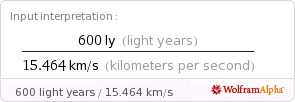Kepler 22b, the extrasolar planet discovered by NASA’s Kepler Space Telescope is apparently around 600 light years away. I wondered how long it would actually take for us to get something there. Maybe if we start today, we could surprise our descendants with a signal from a probe in a 10,000 years or so.
Apparently not. Using the current speed of the Voyager 2 probe as my unscientific example of “something flying through space real fast”, and the handy Wolfram Alpha service, it would take 11.64 million years to get to Kepler 22b.
I find this simultaneously boring and existentially terrifying.
UPDATE:
BoingBoing delves much deeper into the idea of the (im)practicality and cost of interstellar travel. While Kepler 22b might be a boring 11-million-year flight away, the article discusses the nearest star, Alpha Centauri would would be a brisk 70,000 years or so.

Descendants, not ancestors.
So it would take about the same amount of time as waiting for the next post on AoV?
Jake: Fixed, thanks. I’ll leave these comments as a permanent record for my great-grandfather to learn how much of a fool I was.
Joe: The formula my the time between posts here is something like:
(hours in a day) × (2 children) × (my age) × (I’m so tired)
I would put it at between 1 and 18 months.
simultaneously boring and existentially terrifying
Sounds like being in physics class.
I have friends that insist that not only does extraterrestrial life exist but that it has visited earth. Calculations like the above—and the even more interesting ones that indicate how much energy it would take to move a sizable number of people that distance—don’t seem to be convincing to some people.
What does seem to work is asking them what would be worth expending that much energy.
The “amount of time” to travel to ‘Kepler 22b’ is relative to the speed at which you are travelling.
As you already noted that you were using Voyager 2 as you base for calculations, I thought it might be interesting to note that if we master the speed of light for travel you’d be shocked at the amount of time it would take.
(Distance x Speed of light in vacuum) | 1.893×10^10 seconds
Result:
599.9 Gregorian Years
5.999 Gregorian Centuries